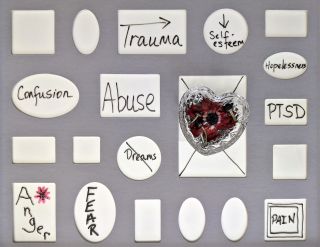OCD
Reflections on OCD
Telling your personal story can be therapeutic and put it in a greater context.
Posted June 2, 2023 Reviewed by Tyler Woods
Key points
- Telling your OCD story can be therapeutic.
- Such stories can remind others they are not alone.
- Listening to and reflecting upon personal experiences can facilitate healing.

My wife and I have suffered from obsessive-compulsive disorder (OCD) together during my military career and in retirement. It has not always been easy. Struggles with intrusive thoughts and disruptive compulsions have negatively affected our relationship at times. At other points, our persistence in overcoming these challenges has made us stronger. Our story is similar to many others, including those who continue to seek adequate resources for counseling, advice, and recovery (Culkin, 2019; Culkin & Culkin, 2021).
OCD, while often underestimated in society, can be detrimental to military veterans, particularly those suffering from post-traumatic stress disorder (PTSD). Recent studies report “the risk for OCD to be increased 10-fold in persons with PTSD,” with a prevalence of over 5 percent for combat veterans and a comorbidity rate of PTSD-OCD as high as 70 percent in some cases (Aldea et al., 2019; Tull, 2023). Once diagnosed, many veterans don’t receive the healthcare services they need to survive and thrive with these conditions (Aldea et al., 2019; McIngvale et al., 2019). As a result, many veterans continue to suffer in silence.
My earliest memory of what I know was a trait of OCD started when I was a third-grade boy and continues today. As a 9-year-old, and likely before then, I was a worrier, checking everything to ensure all was "just right"–whatever that might be. By the time I was twelve, "uncommanded" thoughts about social taboos (mostly about sex, violence, and criminal acts) became increasingly intrusive. At the same time, I became accustomed to these circumstances, rationalizing that everyone experienced these thoughts, doubts, and fears. It wasn’t until I lived with my wife that I realized something was amiss. By year seven of the marriage, I was experiencing ever-frequent and intense episodes of scrupulosity (saying a prayer over and over so it would count), obsessive thoughts, and behavioral rituals (intense brief sessions over listed minutiae, excessive checking, repeated gestures). It was hell to be alone with these doubts and fears, knowing I was hurting the one I love most in this world. Deciding to seek professional help was—and continues to be—life-changing and one of the best choices we’ve made as a family (see Culkin, 2019; Culkin & Culkin, 2021).
Surviving mental illness as a couple is often a personal story written in collaboration with each partner, close family, and friends. The beginning of the story often commences with indicators of a problem: e.g., disruptive compulsions, intrusive thoughts about social taboos, ritualized physical and cognitive behaviors grounded in some irrational fear or doubt. The main characters then come to a fork in the plot—the decision to seek professional help. This choice can be hampered by cultural norms and misperceptions (e.g., those who seek mental health services lose their security clearances, end their careers, and cannot take care of others since they cannot take care of themselves) that resist the redemptive effects of clinical assistance.
How are you writing your family story?
References
Aldea, M., Michael, K., Alexander, K., & Kison, S. (2019). Obsessive-Compulsive Tendencies in a Sample of Veterans with Post-traumatic Stress Disorder. Journal of Cognitive Psychotherapy, 33(1), 33-45. doi: 10.1891/0889-8391.33.1.33. PMID: 32746420
Culkin, D. T. (2019). A Need to Continue Healing: Report of Findings from an Autoethnographic Study. The Qualitative Report, 24(12), 3150-3191. https://doi.org/10.46743/2160-3715/2019.3966
Culkin, D., & Culkin, M. (2021). OCD and Marriage: Pathways to Reshaping Your Lives Together. Specialty Press, Inc.
McIngvale, E., Van Kirk, N., Amspoker, A., Stanley, M., & Fletcher, T. (2019). Prevalence and Treatment of Obsessive-Compulsive Disorder in Veterans and Active-Duty Service Members: A Systematic Review. Journal of Cognitive Psychotherapy, 33(1), 11-22. http://dx.doi.org/10.1891/0889-8391.33.1.11
Tull, M. (2023, January 3). The Link Between PTSD and OCD. Very Well Mind. https://www.verywellmind.com/trauma-ptsd-and-ocd-2797516


